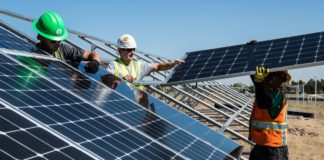Newcastle must be “realistic” about its pledge to reach net zero emissions, leaders on Tyneside have been told.
The city council laid down a commitment in April 2019 to make Newcastle carbon neutral by 2030.
But there have been major questions around whether that ambition can become a reality and pressure is mounting on civic centre officials over how to hit the goal.

Blakelaw cllr Marion Williams, who was in charge of transport and climate change issues on Newcastle City Council’s cabinet until last October, warned last week that the 2030 net zero target cannot be met without “big step changes” in the next few years.
The former Labour cllr, who now represents the East End and Associates Independent group in the council chamber, told a meeting of the council’s climate change committee: “Unless we make big step changes we are not going to meet the target. It is great to be ambitious but we have to be realistic. What are we going to do and what are the measures to make that big step to make the difference?”
Cllr Williams criticised the city’s involvement in a massive waste incinerator project due to be built in Redcar, saying Newcastle needed to urgently increase its recycling rates to stand a chance of reaching net zero.
She also called for stronger planning regulations that would compel housebuilders to connect solar panels on newly-built houses to the grid, saying she had received complaints from homeowners that they were being quoted fees of £8,000 to get the panels working.
The council’s initial net zero plan included ambitions for Newcastle to recycle 20% more waste, cut energy consumption in homes and other buildings by a third and transition 41% of all privately-owned vehicles in Newcastle to electric models.
City-wide carbon dioxide emissions fell by 10.31% between 2019 and 2022, according to figures provided by the council this February.
But the council has been criticised for failing to release full details of what progress had actually been made towards 93 priority actions laid down in September 2020 to decarbonise the city.
Lib Dem llr Mike Cookson told last Thursday’s committee meeting that the council “needs to be doing more”, with colleague Wendy Taylor adding: “Unless we know whether we are on track we can not really see what’s going on. The really important question for me is ‘are we making the progress we need to?’ Are we going to hit the 2030 target? Is it realistic?”
David Trousdale, the council’s principal advisor for climate change, replied: “Recognise that providing information is a really important part of the process, but we need to reflect and balance that with the challenge of providing the right information and help our communities with the challenges around sustainability that they are facing on a daily basis.”
He added: “The targets are ambitious. We are continuing to deliver against them. We continue to work towards that date and we will continue to do so.”
Mr Trousdale had earlier presented an update highlighting eco-friendly projects such as decarbonisation works at swimming pools in Elswick and Jesmond, a trial of food waste collections and tree planting through the North East Community Forest Scheme.




